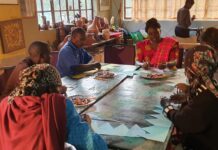By Lilian Mukoche
Kakamega County, Kenya: Since March 15 after the first case of COVID -19 was reported in Kenya, all learning institutions were closed. Many learning institutions including Primary schools both private and public, Secondary schools, Colleges, and Universities have jumbled to ensure learning continues through the use of technologies to access the educational curriculum outside the one-on-one classroom thus e-learning.
Covid-19 has made it known that e-learning is inevitable and learning Institutions together with learners have no choice but to embrace it.
According to the Kenya National Bureau of Statistics (KNBS) 2019 census report, the number of mobile users stands at 20 million (out of 51.39 million Kenyan population). At the same time, just one in five Kenyans have access to the internet.
The statistics further reveal that 29.2 % of the rural population has access to television, 4.2% has access to computers. Also, 21.1% of the urban population has access to computers. These statistics show that there are many students who cannot access online and broadcast education.
Online schooling is effective when you know where to get the right information according to Yvonne Siminyu a form 2 student at Navakholo Secondary Day School in Kakamega County.
She explains that as a teenage girl, she can access other sites online apart from learning if she wanted to but her first priority is studying and attaining higher grades for her future.
“There are some students whose parents care a lot about their education but they don’t. They access all that is required for online schooling but instead of using the opportunity well, they visit online pornographic sites something that has made many perform poorly in class.” She says
“Since schools closed due to Covid-19, our school has not been able to offer us online learning and so it has been up to us as individuals to find ways of learning while at home”. Yvonne says adding that in her case she has been lucky since she was able to access online lessons through a smartphone provided to her by her parents. This helps her concentrate on the weak subjects and weak areas for improvement.
It is not easy though for some students whose parents cannot afford smartphones and bundles to access the internet for they can’t learn online she says.
Caroline Cheboi a second-year student at Masinde Muliro University from Eldoret taking a Bachelor’s Degree in Journalism and Mass Communication has different views on online schooling.
She says to her online learning is helping her in units she had not finished. “I have been able to finish the areas I had not accomplished while at the campus and submitted my assignments and Continuous Assessment Tests online.”
She adds that the government has not given any support to students as they study from home in terms of providing bundles and the resources required.
Evelyn Nawire a business lady whose child is in grade five (5) at Mayiakalo primary school which is a public school in Kakamega County says since the closure of learning institutions due to Covid-19, there has been nothing like e-learning.
“For my case, I get assignments from friends who have children in private schools to at least help my kids revise and study from home.” She says adding that sometimes the lessons on TV also help but not that much since there is always power interruption due to heavy rains being experienced across the country.
Sisinio Muthengi a Nairobi resident and father of four children works as a professor at Kenyatta university says e-learning is 30% effective especially for the kids.
“Children have difficulties having control over online gadgets and it’s a very expensive affair affording to buy gadgets and daily bundles especially with several kids all having online lessons.” He says adding that the government is totally irresponsible and nothing to smile about.
Online schooling is not very effective in public primary schools according to Millicent Khayo a teacher at Kakamega Primary.
Millicent says E-learning is costly and the government hasn’t put in sufficient effort to make this work. This she says is a similar case to most public primary schools across the country.
Cyprian Nyongesa Mukhwana, Head of Department, Humanities at Chebuyusi Boys High School says Covid-19 gives a boost to e-learning only to the well-off families where parents can buy smartphones, computers, laptops, bundles or Wi-fi are in a good environment to access the internet and therefore not effective at all.
“E-learning is not affordable and not easy for not all learners can access the equipment required for this process”, he says adding that the region has a poor network, poor power supply, few instructors and even parents who are to assist the learners are computer illiterate and also the gadgets and internet services are expensive plus theft of E-learning equipment in most schools.
He says the government is not doing enough to support online learning because it has to provide the necessary equipment, supply electricity all over and provide security to schools to safeguard the learning gadgets and educate teachers and parents on the e-learning process.
On whether citizens are informed on where and how to get information, he says they are not informed at all. “First they don’t understand what it is and so they don’t care.” He says.
“To some extent, we have come to appreciate that e-learning can stand on its own as a mode of study,” says Shadrack Opunde a Lecturer-Kiswahili at the Department of Language and literature education at Masinde Muliro University of Science and Technology.
He says e-learning is effective especially as long as students are accessible to the gadgets adding that on the other hand, it’s expensive especially to some students who come from poor backgrounds and cannot access the gadgets and the internet.
Secretary-General UASU MMUST Chapter professor Kubasu Kwashe says Covid-19 has given a boost to online learning in Kenya for it is the only way to reach learners in such a time of crisis.
“This pandemic is a health crisis that has awakened up many institutions which are yet to embrace online learning. This is the only way to go to make sure learners continue attaining knowledge.” He says.
Professor Kwashe who is an associate professor of Biology, Masinde Muliro University of Science and Technology says he cannot rate e-learning very high for it has various challenges making it not attain the 100% mark.
“Not all students have the gadgets required to access online learning because the majority come from poor backgrounds and therefore can’t afford these gadgets.” He adds saying that where learners have the gadgets, there is a challenge for they cannot function in areas without network, and power for a sizeable portion of Kenya does not have electricity.
He says with online engagements, matters of security of documents arise like in the case of examinations there is no total assurance that the information is safe adding that not all teaching fraternity have access to gadgets neither are they ICT competent.
In the case of government support to institutions during this period he says the government is doing very little in both training, infrastructure, and making sure that every part of the country has a strong network to access the internet.
He urges the government to put more effort into distributing the power grid across the country.















